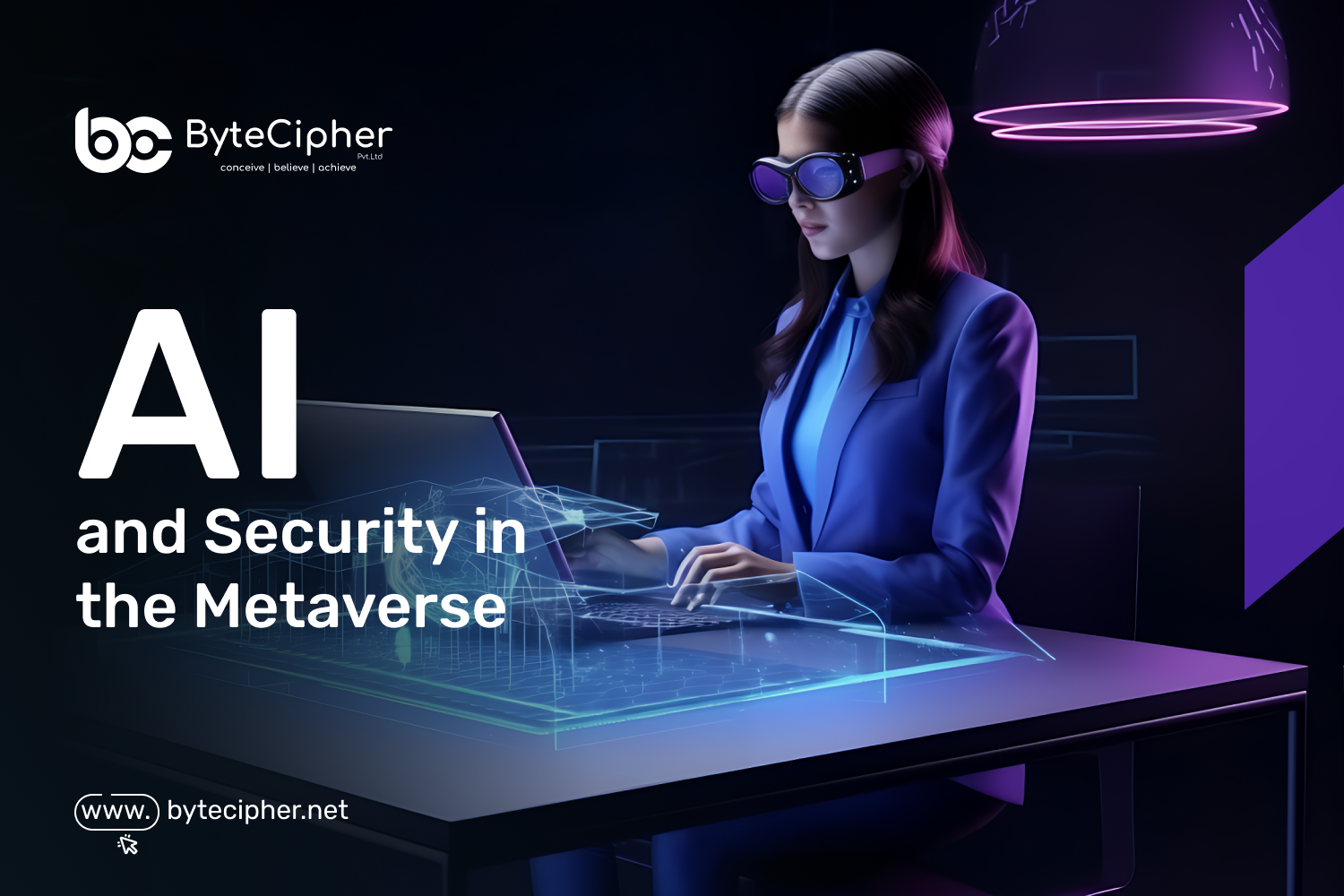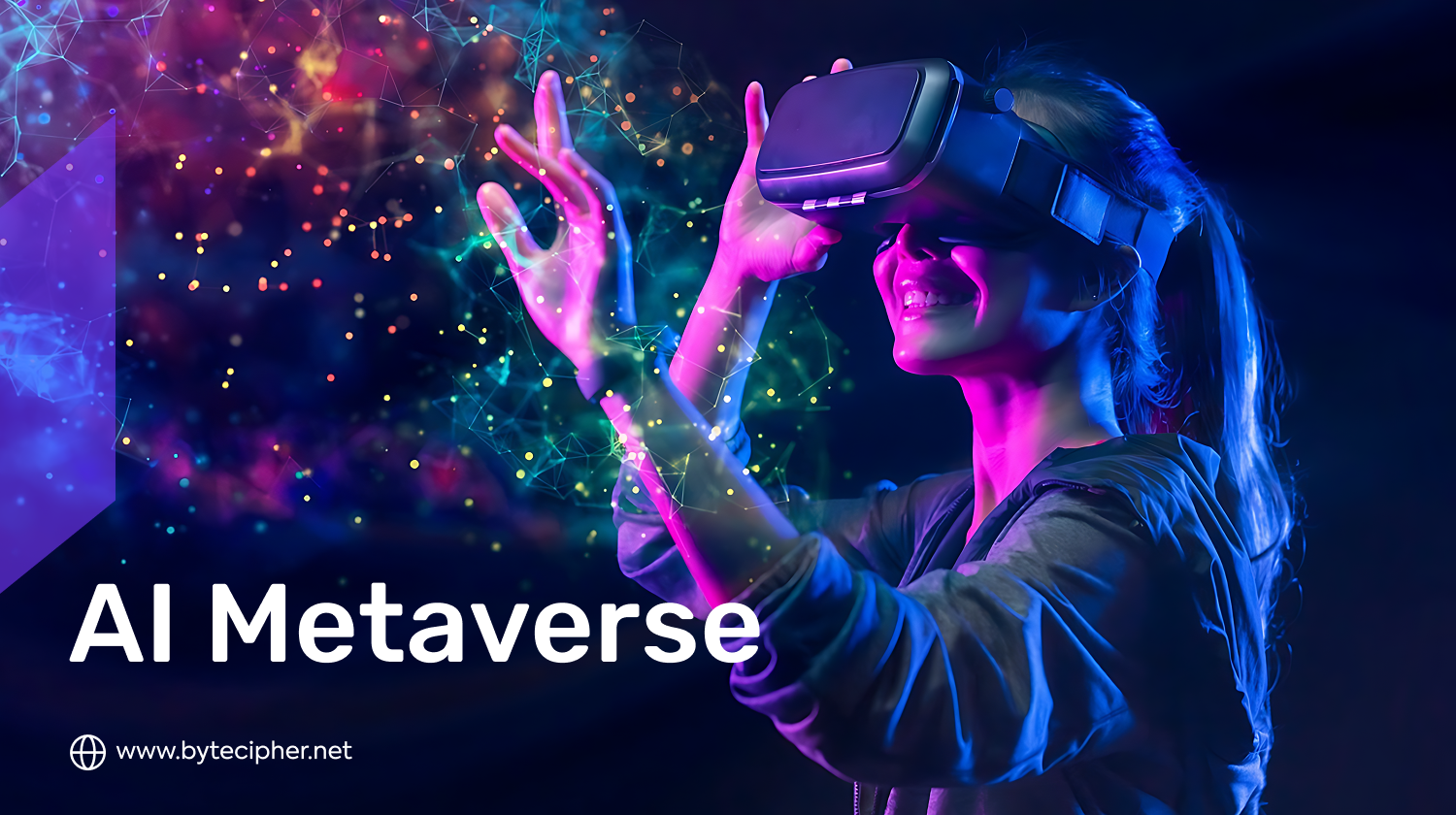
The metaverse is developing into a virtual world where users can interact with others, work, shop, and play in realistic three-dimensional settings. New opportunities, nevertheless, often bring new risks. The metaverse presents special security issues, such as identity theft, fraud, harassment, and hacking of digital assets, just like the internet does.
In order to mitigate these threats, artificial intelligence (AI) is emerging as the key to metaverse security. AI guarantees the safety, inclusivity, and reliability of this new digital frontier by identifying dangers, regulating material, and safeguarding identities.
Comprehending Metaverse Security Risks
The metaverse’s immersive features produce both thrilling adventures and challenging dangers:
- Impersonation and Identity Theft: In order to deceive others, hackers may fabricate deepfakes or steal avatars.
- Fraud and frauds: It is possible for fraudulent crypto transactions, NFT frauds, or fake digital asset sales to take place.
- Harassment and Abuse: In virtual environments, users may experience inappropriate behavior, bullying, or stalking.
- Data Privacy Hazards: Gestures, voice recordings, and facial scans are examples of sensitive data that could be misused.
- Virtual Property Theft: Theft of assets, skins, and avatars can cause both material and psychological harm.
AI is well positioned to provide sophisticated, real-time security solutions, which are necessary in light of these hazards.
How Artificial Intelligence Strengthens Metaverse Security
Strong methods to protect users and digital surroundings are provided by AI:
- Identifying Deepfakes and Impersonations
Artificial intelligence (AI) systems detect altered information and shield consumers against phony personas or avatar cloning. - Moderating in Real-Time
I systems driven by natural language processing (NLP) can identify harmful content, harassment, and hate speech in real-time interactions. - Fraud Identification in Transactions
Blockchain and cryptocurrency transactions are constantly monitored by AI, which highlights any unusual trends. - Examining Behavior
AI examines user behavior to identify irregularities that can indicate dangers, including movement, communication style, and transaction history. - Better Authentication
Through speech recognition, biometric verification, and ongoing identity monitoring, AI improves security.
In the Metaverse, How Can Artificial Intelligence Fit in?
In order to envision the metaverse, one of the most important technologies is artificial intelligence (AI). AI is what gives these virtual worlds their intelligence, realism, and flexibility, even if the metaverse offers persistent, immersive, and three-dimensional environments.
In the metaverse, intelligent avatars are one of the most important ways AI is included. Avatars that mimic human gestures, emotions, and speech patterns are made possible by AI, replacing static, lifeless figures and bringing a sense of naturalness to digital interactions. These avatars have the ability to change over time in response to user preferences, behaviors, and communication styles.
Personalized metaverse experiences are also improved by AI. Artificial Intelligence will examine user behavior, social contacts, and digital decisions to generate personalized metaverse experiences, much like streaming services recommend films or e-commerce websites sell goods. Product recommendations in virtual malls or virtual concerts or exhibitions could be examples of this.
Creation of content and worlds is another area where AI is revolutionizing the industry. Character, landscape, and environment design in 3D has always involved a great deal of human labor. In just a few seconds, AI may create dynamic non-playable people (NPCs), realistic graphics, and even whole virtual environments. The metaverse is hence scalable and constantly growing.
AI also resolves real-time language translation, one of the major problems in international digital engagement. Users from various linguistic backgrounds may converse easily thanks to AI-driven natural language processing, which eliminates language barriers in casual gaming, business meetings, and instructional sessions.
Lastly, in digital economy, AI guarantees efficiency and security. The metaverse will be mostly dependent on digital assets such as NFTs and cryptocurrencies. AI is capable of monitoring suspicious transactions, spotting fraud, and even controlling virtual economies to keep markets stable.
AI is the intelligence layer that drives the metaverse, making it more dynamic, scalable, and available to users everywhere. In other words, it is not only a supporting technology.
What Is the Metaverse’s Reaction to AI?
AI integration into the metaverse is already taking place; it is not just a pipe dream. AI is actively forming environments in the metaverse where it shapes the user experience rather than merely serving as a tool.
Interactions powered by AI are the initial area of adoption. AI-powered chatbots, virtual assistants, and non-playable characters (NPCs) are all getting more advanced and can have conversations that sound natural and human. These AI-powered beings can serve as mentors in virtual learning settings, customer service representatives in online shops, or even guides in virtual cities.
Second, the combination of blockchain and AI is expected to revolutionize metaverse trust. Blockchain guarantees transparency and decentralization, while AI improves predictive analysis, fraud detection, and decision-making. They work together to offer a reliable and safe infrastructure for digital identity management, ownership verification, and financial transactions.
Additionally, the metaverse is embracing AI in the fields of education and professional collaboration. AI tutors in virtual classrooms are able to provide individualized instruction by adjusting to each student’s pace and preferred method of learning. AI productivity aides will be used in business settings to manage activities, replicate real-world situations, and enhance teamwork amongst geographically dispersed groups.
AI for metaverse smart cities is another fascinating advancement. Businesses and governments are already employing digital twins, which are virtual representations of real-world surroundings, to model metropolitan infrastructures. Urban planners will be able to forecast energy usage, traffic patterns, and disaster response plans thanks to AI in the metaverse, making real-world cities smarter and more effective.
In adaptable contexts, welcome is arguably the most significant. Based on user activity, the metaverse will employ AI to dynamically modify settings. In gaming, for instance, the AI may dynamically change the level of difficulty according to player expertise. AI may alter product recommendations and store designs in the retail industry based on consumer interactions.
The metaverse is laying the groundwork for AI to become an integral component of the digital ecosystem, not merely “allowing” it to take part.

Which guidelines govern the Metaverse’s responsible use of AI?
Establishing guiding principles for the appropriate and ethical use of AI and the metaverse is crucial as they develop together. Without them, the advantages could be outweighed by the dangers of abuse, prejudice, or exploitation.
1. Being open and honest
Users need to be able to tell whether they are speaking with an AI system rather than a human. Whether it’s an AI avatar, digital assistant, or chatbot, openness fosters trust and prevents dishonesty.
2. Preservation of Privacy
Voice, mobility, and biometric data are among the sensitive information that the metaverse will gather. AI must be built with user privacy in mind, making sure that data is never misused, stored safely, and anonymized where feasible.
3. Equitable and Inclusive
To prevent bias, varied datasets must be used to train AI systems. Equality guarantees that no group is subjected to discrimination on the basis of race, gender, culture, or aptitude in a global metaverse. Accessibility features for individuals with disabilities, including voice-activated navigation or AI-generated subtitles, are guaranteed by inclusive AI.
4. Design-Based Security
Digital identities and assets will play a major role in the metaverse. To stop identity theft, detect fraud, and defend against online dangers, AI must be developed with strong security features. Additionally, AI ought to instantly adjust to new dangers.
5. Human supervision
Decision-making can be automated by AI, but human judgment is still required for key decisions. By doing this, accountability is guaranteed and AI is kept from making bad or immoral decisions on its own without human input.
6. Adaptability
AI system operation and training use a lot of energy. AI models must be made more efficient through the use of energy-efficient design and green data centers if the metaverse is to be sustainable.
By following these guidelines, companies, developers, and legislators may make sure AI improves the metaverse while upholding user confidence and encouraging sustainability over the long run.
The Difficulties of AI Use in Metaverse Security
AI has its own set of difficulties even though it offers useful tools:
- Algorithm bias: Sometimes, AI moderation tools will unjustly reject or approve content.
- Concerns about Over-Surveillance: Excessive surveillance may jeopardize freedom and privacy.
- 3D environment complexity: AI needs to adjust to identifying dangers in dynamic, immersive environments.
- Adversarial Attacks: Hackers might try to trick AI systems by using altered inputs.
One major problem will continue to be striking a balance between security and privacy, equity, and inclusivity.
The Prospects of AI in Metaverse Protection
Security systems with AI capabilities will be more intelligent, quicker, and cooperative in the future. A few potential developments are:
-
Secure user data without central storage is possible with Federated Learning AI.
-
Models of adaptive AI that change in response to new dangers.
-
Incorporating blockchain technology to make transactions safer and more transparent.
-
AI systems with cross-platform capabilities that protect consumers on various metaverse platforms.
Virtual environments will become safer for everyone as AI develops as the digital guardian as the metaverse grows.
Conclusion
The metaverse has the potential to revolutionize digital interaction, but its potential may be jeopardized in the absence of robust security. AI is the first line of security since it can identify threats, safeguard identities, and maintain trust in virtual environments.
Developing AI systems that are not just safe but also moral, objective, and privacy-preserving is a difficult task. AI will guarantee that the metaverse develops into a secure, welcoming, and revolutionary digital future if it is used properly.
Answers to Common Questions (FAQ)
Q1. What role does AI play in the security of the metaverse?
AI makes immersive settings safer by preventing fraud, protecting identities, and detecting threats in real time.
Q2. What dangers are there in the metaverse?
Users may experience privacy concerns, identity theft, harassment, frauds, and virtual property theft.
Q3. Is AI able to stop every security problem in the metaverse?
Risks are greatly decreased with AI, but they cannot be totally eliminated. Human supervision and moral principles are still crucial.
Q4. How does AI identify fraudulent transactions in the metaverse?
AI keeps an eye on blockchain and cryptocurrency trends, quickly identifying odd or suspicious activity.
Q5. How will AI be used to secure the metaverse in the future?
Blockchain integration, adaptive AI, and more individualized security models that change in response to emerging threats are the ways of the future.


